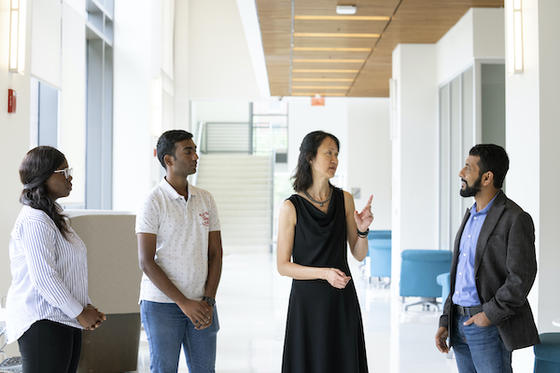A George Mason University multidisciplinary research team recently received $5,000 in funding from the VentureWell Accelerator to continue to develop their app, iCONNECT SUD.
The team, which includes recent alumna Rebecca Leung, PhD students Dylan Scarton and Tolulope Abidogun, and second year graduate student Srinath Silla, calls themselves the Good Troublers. Their project started as part of the National Science Foundation-funded National Research Traineeship (NRT) program at the Center for Adaptive Systems of Brain Body Interactions (CASBBI).

“[The NRT Program] trains graduate students to utilize design thinking principles and develop an entrepreneurial mindset to solve the pressing issues in society today using a community-engaged user-centered approach,” said Siddhartha Sikdar, CASBBI director.
“This funding will help the team translate their work and have a real impact in the community.”
Mason was recently ranked No. 1 for research performance in entrepreneurship among public universities, and No. 2 overall nationally, in the latest report from EduRank. The NRT Program is one of a series of programs at Mason designed to help researchers bring their discoveries to market.
The iCONNECT app uses smart technology, such as customized experiences and automated or user-defined identification of local resources, to help those who are struggling with or recovering from substance use disorder (SUD).
“The grant not only helps us in procuring hardware and software to optimize development, it gives us credibility and will also help us with future grants to sustain our work,” said Leung, co-founder of the team who recently graduated from Mason with a master of social work degree.
The team received the grant as part of their Stage 1 or "Pioneer" funding through VentureWell’s E-Team Program to attend a 2-day start-up entrepreneurship workshop at The Engine in Cambridge, Massachusetts, where they were provided with additional guidance for the use of their funds. Any remaining funds after the Stage 1 workshop expenses are covered will be used to further develop their app.
“It was actually our second time applying for the VentureWell grant,” said Dylan Scarton, a neuroscience PhD student and another co-founder of the team. “They gave us feedback [of items] to address and said that we should be good for the next round.”

VentureWell funds for-profit enterprises and some nonprofits, like iCONNECT, that tend to focus on social challenges and health-related innovations. The team’s mentors, Mason mathematics professor Padhu Seshaiyer and social work professor Holly Matto, encouraged them to apply for the funding to help them advance the app.
Tolulope Abidogun, a public health PhD student, is one of the new members of Good Troublers. She works with the team to structure the research side of the app deployment.
“One major goal for us moving forward is to make the [SUD resource collation] process more efficient. It's going to take a lot of groundwork, going to different places and people to get information,” said Abidogun.
The app is currently available and free for all to download, but the beta version only has vetted local resources used by peer recovery specialists in Falls Church and Fairfax County. The team hopes to continue expanding its reach throughout the Washington, D.C., area.
The team is currently gathering information in Arlington, Falls Church, and Fairfax, Virginia, and they hope to implement iCONNECT SUD into the practice of peer recovery specialists in those regions by the end of the year.
In This Story
Related News
- November 5, 2025
- October 10, 2025
- May 2, 2025
- January 31, 2025
- June 6, 2024
